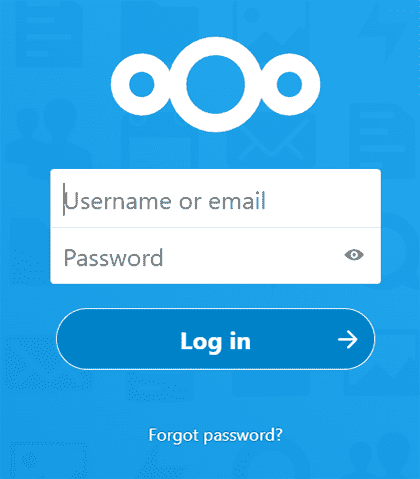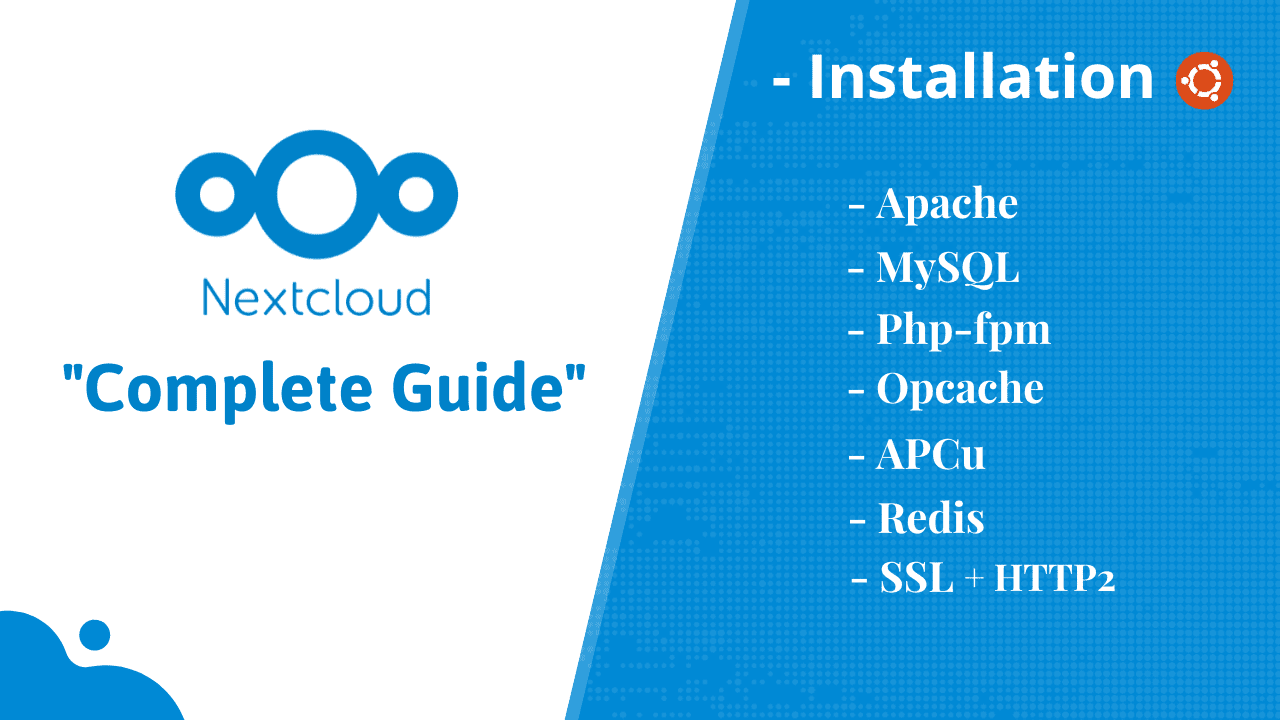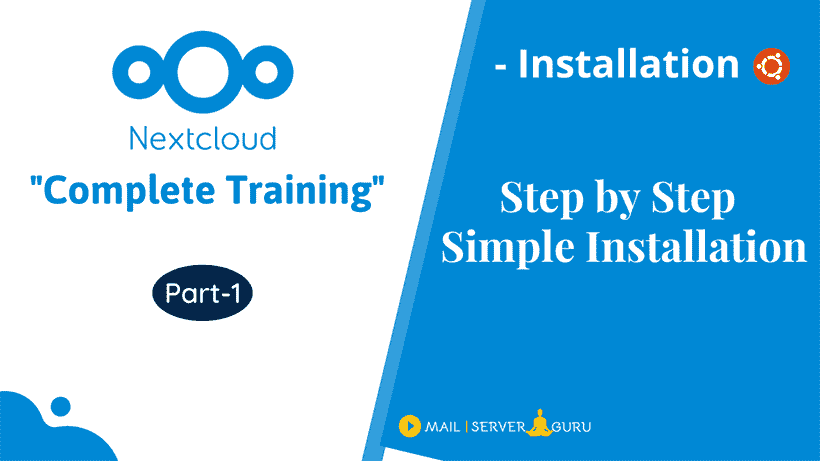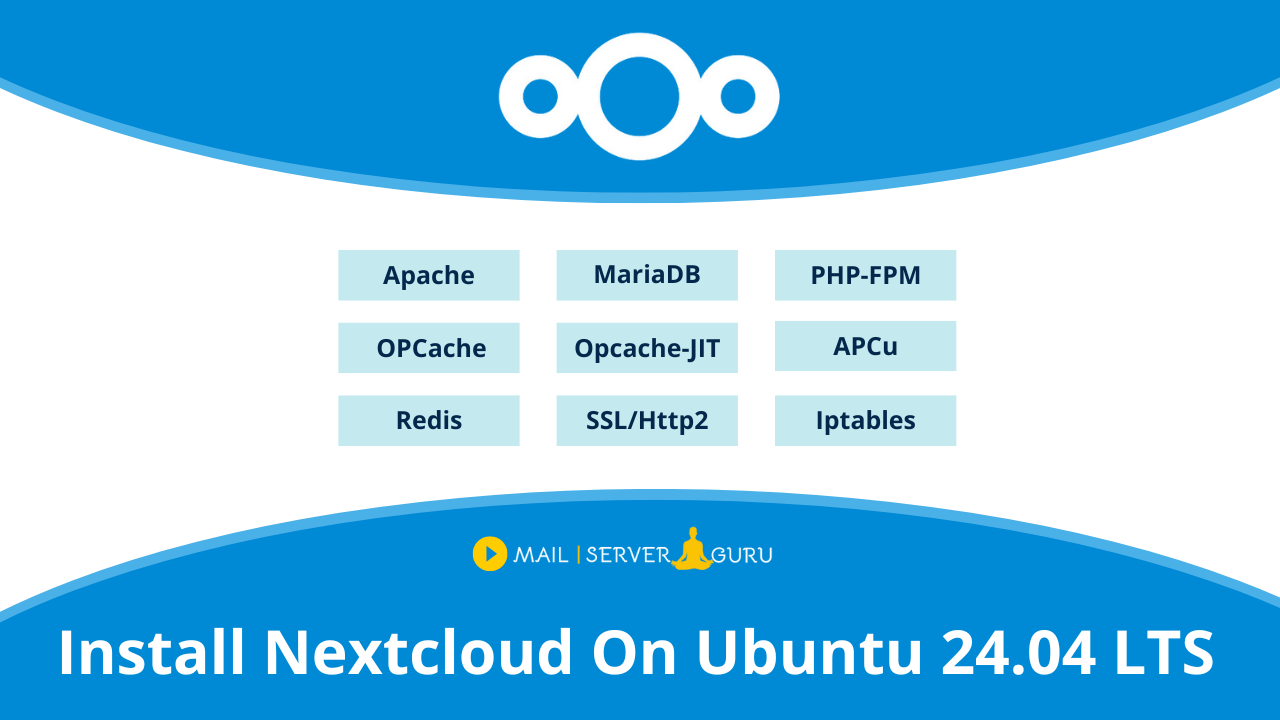In this tutorial, we are going to see How to Install NextCloud On Ubuntu 22.04 LTS. This will be a detailed setup, we have provided steps to increase the performance of Nextcloud and apply all the security measures needed to secure the server.
Nextcloud is a file hosting system that allows us to store our content like documents, pictures, videos, etc, and share it with others.
Instead of relying on external service providers for our personal and business documents, Nextcloud gives us the freedom to store them on our servers or in trusted data centers. it’s a self-managed centralized document and file management system.
Below we provided a detailed step-by-step guidelines on how to install Nextcloud on Ubuntu 22.04 LTS. To maintain high performance and security, we have added necessary steps to add more features on the system. Each steps are highly recommended to setup a production grade Nextcloud environement.
Step1: Install Required Packages
1. Update and Upgrade the Ubuntu Packages
apt update && apt upgrade
2. install Apache and MySQL Server
apt install apache2 mariadb-server
3. Install PHP and other Dependencies and Restart Apache
apt install libapache2-mod-php php-bz2 php-gd php-mysql php-curl php-zip \
php-mbstring php-imagick php-ctype php-curl php-dom php-json php-posix \
php-bcmath php-xml php-intl php-gmp zip unzip wget
4. Enable required Apache modules and restart Apache:
a2enmod rewrite dir mime env headers
systemctl restart apache2
Step2. Configure MySQL Server
1. Login to MySQL Prompt, Just type
mysql
2. Create MySQL Database and User for Nextcloud and Provide Permissions.
CREATE USER 'nextcloud'@'localhost' IDENTIFIED BY 'passw@rd';
CREATE DATABASE IF NOT EXISTS nextcloud CHARACTER SET utf8mb4 COLLATE utf8mb4_general_ci;
GRANT ALL PRIVILEGES ON nextcloud.* TO 'nextcloud'@'localhost';
FLUSH PRIVILEGES;
quit;Step3. Download, Extract, and Apply Permissions.
Now download the latest Nextcloud archive file, Go to the Nextcloud Download Page. Or you can download from direct link: https://download.nextcloud.com/server/releases/latest.zip
1. Download and unzip at the /var/www folder
cd /var/www/
wget https://download.nextcloud.com/server/releases/latest.zip
unzip latest.zip
2. Remove the zip file, which is not necessary now.
rm -rf latest.zip
3. Change the ownership of the nextcloud content directory to the HTTP user.
chown -R www-data:www-data /var/www/nextcloud/Step4. Install NextCloud From the Command Line
We are going to install Nextcloud on Ubuntu 22.04 from the command line, it will save us time as we are providing all the database and admin credentials for installation. It will install Nextcloud silently, we don’t have to go through web setup. For detailed Nextcloud Command line installation, visit this page.
1. Run the CLI Command
cd /var/www/nextcloud
sudo -u www-data php occ maintenance:install --database \
"mysql" --database-name "nextcloud" --database-user "nextcloud" --database-pass \
"passw@rd" --admin-user "admin" --admin-pass "admin123"
If everything goes well the command will output “Nextcloud was successfully installed”. We provided a very simple user/password, during production setup, this must be a complex password.
2. nextcloud allows access only from localhost, it could through error “Access through untrusted domain”. we need to allow accessing nextcloud by using ip or domain name.
vi /var/www/nextcloud/config/config.php
'trusted_domains' =>
array (
0 => 'localhost',
1 => 'nc.mailserverguru.com', // we Included the Sub Domain
),
.....
:x // saving the file3. Configure Apache to load Nextcloud from the /var/www/nextcloud folder.
vi /etc/apache2/sites-enabled/000-default.conf
<VirtualHost *:80>
ServerAdmin webmaster@localhost
DocumentRoot /var/www/nextcloud
ErrorLog ${APACHE_LOG_DIR}/error.log
CustomLog ${APACHE_LOG_DIR}/access.log combined
</VirtualHost>
// Now, Restart Apache Server
systemctl restart apache2Now, Go to the Browser and type http:// [ ip or fqdn ] of the server, The below Nextcloud login page will appear.

The Basic NextCloud Installation on Ubuntu 22.04 is completed, Now we are going to Work on the Performance and Security.
Step5. Install and Configure PHP-FPM with Apache
Here we will install PHP-FPM, which is faster than the mpm-prefork module, which is the default method of executing php files on Apache.
1. Install php-fpm
apt install php8.1-fpm
service php8.1-fpm status // Check the php-fpm is running
2. Check the php-fpm version and Socket.
php-fpm8.1 -v
ls -la /var/run/php/php8.1-fpm.sock
3. Disable Apache prefork module
a2dismod php8.1
a2dismod mpm_prefork
4. Enable php-fpm
a2enmod mpm_event proxy_fcgi setenvif
a2enconf php8.1-fpm
5. set required php.ini variables
vi /etc/php/8.1/fpm/php.ini
upload_max_filesize = 64M
post_max_size = 96M
memory_limit = 512M
max_execution_time = 600
max_input_vars = 3000
max_input_time = 1000
:x
6. php-fpm pool Configurations
vi /etc/php/8.1/fpm/pool.d/www.conf
pm.max_children = 64
pm.start_servers = 16
pm.min_spare_servers = 16
pm.max_spare_servers = 32
:x
service php8.1-fpm restart
7. Apache directives for php files processing by php-fpm
vi /etc/apache2/sites-enabled/000-default.conf
<VirtualHost *:80>
ServerAdmin webmaster@localhost
DocumentRoot /var/www/nextcloud
<Directory /var/www/nextcloud>
Options Indexes FollowSymLinks
AllowOverride All
Require all granted
</Directory>
<FilesMatch ".php$">
SetHandler "proxy:unix:/var/run/php/php8.1-fpm.sock|fcgi://localhost/"
</FilesMatch>
ErrorLog ${APACHE_LOG_DIR}/error.log
CustomLog ${APACHE_LOG_DIR}/access.log combined
</VirtualHost>
:x
service apache2 restartStep6. Create info.php Page for php feature check
Create an info.php page, it will show us whether php-fpm, opcache, apcu are enabled with the php.
cd /var/www/nextcloud
vi info.php
<?php phpinfo(); ?>
:x
Now Browse http://nc.mailserverguru.com/info.php, it will show “Server API FPM/FastCGI” if the php-fpm is enabled on the PHP.

Step7. Enable Opcache in php
Opcache is a caching engine for PHP. It stores precompiled script bytecode in shared memory, so parsing PHP scripts on each request won’t be necessary. It increases php file execution and website loading performance.
vi /etc/php/8.1/fpm/php.ini
opcache.enable=1
opcache.enable_cli=1
opcache.interned_strings_buffer=8
opcache.max_accelerated_files=10000
opcache.memory_consumption=128
opcache.save_comments=1
opcache.revalidate_freq=60
:x
// Now, Restart apache and php-fpm
systemctl restart php8.1-fpm
systemctl restart apache2Now, Check http://nc.mailserverguru.com/info.php again, it will show the “Opcache is Up and Running”

Step8. Enable APCu in php
APCu is the user data caching. It is a local cache for systems. Nextcloud uses this for memory caching.
1. Install APCu
apt install php8.1-apcu
2. Configure Nextcloud to use APCu for memory caching.
vi /var/www/nextcloud/config/config.php
'memcache.local' => '\OC\Memcache\APCu',
:x
// Restart php-fpm and apache
systemctl restart php8.1-fpm
systemctl restart apache2Now, Check the http://nc.mailserverguru.com/info.php again, it will show the “APCu support Enabled”

Step9. Install and Configure Redis
In Nextcloud, Redis is used for local and distributed caching as well as transactional file locking. we used APCu for Local Cahing which is faster than Redis. We will use Redis for File locking. Nextcloud’s Transactional File Locking mechanism locks files to avoid file corruption during normal operation.
1. Install Redis Server and Redis php extension
apt-get install redis-server php-redis
systemctl start redis-server
systemctl enable redis-server
2. Configure Redis to use Unix Socket than ports
vi /etc/redis/redis.conf
port 0
unixsocket /var/run/redis/redis.sock
unixsocketperm 770
:x
3. Add Apache user to the Redis group
usermod -a -G redis www-data
4. Configure Nextcloud for using Redis for File Locking
vi /var/www/nextcloud/config/config.php
'filelocking.enabled' => 'true',
'memcache.locking' => '\OC\Memcache\Redis',
'redis' => [
'host' => '/var/run/redis/redis.sock',
'port' => 0,
'dbindex' => 0,
'password' => '',
'timeout' => 1.5,
],
:x
5. Enable Redis session locking in PHP
vi /etc/php/8.1/fpm/php.ini
redis.session.locking_enabled=1
redis.session.lock_retries=-1
redis.session.lock_wait_time=10000
:x
// Now, Restart php-fpm and apache
systemctl restart php8.1-fpm
systemctl restart apache2Now, we can check Redis use, (by enabling the Redis port in the Redis configuration) by running the command “redis-cli MONITOR“, during Nextcloud loading it will show live data on the screen.
Now, that we have finished Performance improvement steps. We are going to work for the Security, First of all, we will install an SSL certificate for Nextcloud.
Step10. Install SSL and Enable HTTP2
1. We will install the LetsEncrypt certificate, so, first, we need the Certbot tools.
apt-get install python3-certbot-apache -y
2. with the Certbot tool, let’s request a Certificate for our domain.
certbot --apache -d nc.mailserverguru.com
Saving debug log to /var/log/letsencrypt/letsencrypt.log
Enter email address (used for urgent renewal and security notices)
(Enter 'c' to cancel): [email protected] // Input Email Address
- - - - - - - - - - - - - - - - - - - - - - - - - - - - - - - - - - - - - - - -
Please read the Terms of Service at
https://letsencrypt.org/documents/LE-SA-v1.2-November-15-2017.pdf. You must
agree in order to register with the ACME server. Do you agree?
- - - - - - - - - - - - - - - - - - - - - - - - - - - - - - - - - - - - - - - -
(Y)es/(N)o: Y // Press Y here
- - - - - - - - - - - - - - - - - - - - - - - - - - - - - - - - - - - - - - - -
Would you be willing, once your first certificate is successfully issued, to
share your email address with the Electronic Frontier Foundation, a founding
partner of the Let's Encrypt project and the non-profit organization that
develops Certbot? We'd like to send you email about our work encrypting the web,
EFF news, campaigns, and ways to support digital freedom.
- - - - - - - - - - - - - - - - - - - - - - - - - - - - - - - - - - - - - - - -
(Y)es/(N)o: Y // Press Y here
Account registered.
Requesting a certificate for nc.mailserverguru.com
Successfully received certificate.
Certificate is saved at: /etc/letsencrypt/live/nc.mailserverguru.com/fullchain.pem
Key is saved at: /etc/letsencrypt/live/nc.mailserverguru.com/privkey.pem
This certificate expires on 2022-10-13.
These files will be updated when the certificate renews.
Certbot has set up a scheduled task to automatically renew this certificate in the background.
Deploying certificate
Successfully deployed certificate for nc.mailserverguru.com to /etc/apache2/sites-available/000-default-le-ssl.conf
Congratulations! You have successfully enabled HTTPS on https://nc.mailserverguru.com
We were unable to subscribe you the EFF mailing list because your e-mail address appears to be invalid. You can try again later by visiting https://act.eff.org.
- - - - - - - - - - - - - - - - - - - - - - - - - - - - - - - - - - - - - - - -
If you like Certbot, please consider supporting our work by:
* Donating to ISRG / Let's Encrypt: https://letsencrypt.org/donate
* Donating to EFF: https://eff.org/donate-le
- - - - - - - - - - - - - - - - - - - - - - - - - - - - - - - - - - - - - - - -
3. Enable apache HTTP2 module and configure site for the http2 protocols
a2enmod http2
vi /etc/apache2/sites-enabled/000-default-le-ssl.conf
<VirtualHost *:443>
Protocols h2 h2c http/1.1
ServerAdmin webmaster@localhost
DocumentRoot /var/www/nextcloud
......
:x
// Now, Restart Apache
systemctl restart apache2
4. Test the http2 protocol, by sending an http2 request to the web server.
curl -I --http2 -s https://nc.mailserverguru.com/ | grep HTTP
HTTP/2 200Or, we can Inspect the Browser while accessing Nextcloud URL, we can easily see the protocol column from the Network tab, and it will show h2 as the protocol which is http2.

5. HTTP Strict Transport Security, which instructs browsers not to allow any connection to the Nextcloud instance using HTTP, prevents man-in-the-middle attacks.
<VirtualHost *:443>
ServerName nc.mailserverguru.com
<IfModule mod_headers.c>
Header always set Strict-Transport-Security "max-age=15552000; includeSubDomains"
</IfModule>
</VirtualHost>
Step11. Pretty URL’s
Pretty URLs remove the "index.php” part in all Nextcloud URLs. It will make URLs shorter and prettier.
vi /var/www/nextcloud/config/config.php
'htaccess.RewriteBase' => '/',
:x
// This command will update the .htaccess file for the redirection
sudo -u www-data php --define apc.enable_cli=1 /var/www/nextcloud/occ maintenance:update:htaccess
So, this is it..
We have done our Complete Install NextCloud On Ubuntu 22.04 LTS.
Thanks !!






Responses